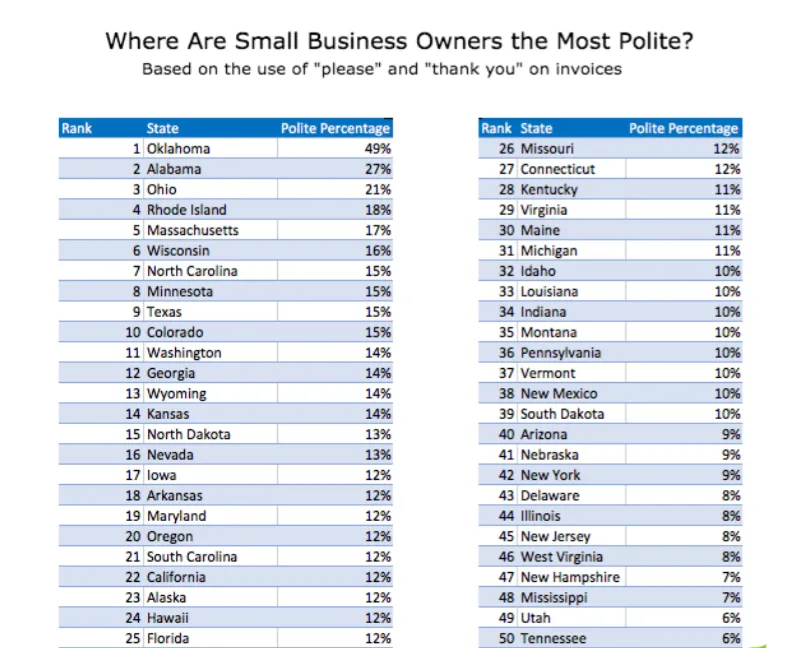Say what you might about manners these days, but when it comes to invoicing a polite "please" or "thank you" can be a difference-maker. Let's take a look at the most polite states in America.

In order to figure out where you can find the most polite small business owners in the country, FreshBooks analyzed over 250,000 invoices to see where business owners were most likely to say “please” and “thank you” on their invoices—a clear gauge of good manners and politeness.
Are southern states blessed with southern charm when it comes to invoicing? Are bigger states the most polite states in America? What’s the rudest state in America? Keep reading, all burning questions are answered below.
According to our data, if you’re looking to have polite interactions with the businesses you frequent, your best bet would be to travel to the country’s top spot: Oklahoma, where nearly half (49 percent) of business owners used “please” and “thank you” on their client invoices. Alabama (27 percent), Ohio (21 percent), and Rhode Island (18 percent) are also home to a solid amount of polite small business owners.
On the flip side, some states you want to avoid—at least from a politeness perspective—include Tennessee and Utah, where just 6 percent of small business owners included pleasantries on their invoices, as well as Mississippi and New Hampshire (both of which clocked in at 7 percent).
So, where does your state tend to fall on the politeness spectrum? Here are the ten most polite states in America, according to our small business invoice research.
- Oklahoma, 49 percent
- Alabama, 27 percent
- Ohio, 21 percent
- Rhode Island, 18 percent
- Massachusetts, 17 percent
- Wisconsin, 16 percent
- North Caroline, 15 percent
- Minnesota, 15 percent
- Texas, 15 percent
- Colorado, 15 percent
Interestingly, the states in America with the most (and least) polite small business owners don’t necessarily correlate where you’ll find polite people or rude people.
In order to determine the most polite states in America, a recent survey from YouGov asked people whether they thought residents of their state tended to be more polite or more rude than people in other states.
And what they found was that the rudest people (at least from their own perspective) were in Rhode Island, where 42 percent of respondents said they thought RI residents were more rude than residents of other states. But when studying small business owners, Rhode Island was actually near the top of the list (#4) for the most polite folks.
Then there’s “Minnesota Nice”, which is explained as the following: Applied to the behavior of people from Minnesota implying residents are unusually courteous, reserved, mild-mannered, and passive-aggressive. The phrase also implies polite friendliness, an aversion to open confrontation, a tendency toward understatement, a disinclination to make a direct fuss or stand out, apparent emotional restraint, and self-deprecation.
So, how does “Minnesota Nice” translate to small business invoicing? Here’s what some reporters from Wisconsin had to say.
Massachusetts also views itself as a rude state, with 40 percent of the population saying their citizens were more rude than in other cities or states.
Rudest States in America
- Rhode Island (42 percent said “more rude”)
- Massachusetts (40 percent)
- New Jersey (34)
- New York (30)
- Nevada (29)
- Connecticut (28)
- Florida (27)
- California (27)
- DC (24)
- Pennsylvania (23)
Most Polite States in America
- Hawaii (60 percent said “more polite”)
- Vermont (51 percent)
- South Dakota (51 percent)
- North Dakota (49 percent)
- Wyoming (49 percent)
- Montana (48 percent)
- Minnesota (47 percent)
- Tennessee (45 percent)
- Alaska (44 percent)
- Idaho (44 percent)
Why Being Polite In The Workplace Matters
Now that you know where to find the most (and least!) polite small business owners in the US, let’s quickly touch on why, as a small business owner, being polite in the workplace actually matters.
As a small business owner, if you want to empower your team to do their best work, fostering a work environment that promotes kindness and politeness is an absolute must—as rude environments can cause productivity to plummet.
Research outlined in the Harvard Business Review found that when employees experienced incivility (which is defined as “low-intensity deviance at work” and covers the gamut of rude behavior, from snide comments to dismissive emails) 48 percent intentionally decreased their effort at work. 47 percent intentionally decreased their time at work, and 48 percent intentionally decreased the quality of their work. The experienced rudeness also caused 78 percent of employees to feel less committed to the company.
So, if rudeness is a part of your work culture, it can drive your workers to work less and to work less efficiently. And as their commitment to the company drops, they may be more likely to look for a new job—which can make it hard to retain top talent.
Not only that, but if rudeness exists in your business, it could spread to your customers. One study found that when people experience rudeness, they’re more likely to be rude themselves. So when your employees experience rudeness at work, they’re more likely to be impolite to your customers—which can have a seriously negative impact on your business overall.
A Case Study In Why Being Polite Pays Off
Clearly, being polite—and avoiding rudeness—can set your business up for success. But what does that look like in practice?
During the pandemic, when fast-food restaurants were forced to pivot to drive-thru and curbside operations, Chick-fil-A made a conscious decision to focus on customer service. They designed a drive-thru check-point system where customers had multiple interactions with employees, including ordering payment, and meal delivery—each of which delivered an opportunity for politeness and hospitality.
And that politeness and hospitality were overwhelmingly recognized by their customers. According to the 2021 QSR® Drive-thru Study, an industry that analyzes performance in the fast-food industry, 85.7 percent of Chick-fil-A customers rated their service as friendly or pleasant—and 0 percent of interactions with Chick-fil-A employees were ranked as lackadaisical or rude. That’s in stark contrast to other fast food establishments like Arby’s (where only 47.6 percent of interactions were ranked as friendly or pleasant, while 14.3 percent were ranked as lackadaisical or rude), Burger King (47.3 percent friendly or pleasant vs. 22.2 percent lackadaisical or rude,) or KFC (59.2 friendly or pleasant vs. 18.5 lackadaisical or rude).
The decision to prioritize politeness paid off for Chick-fil-A. Even though Chick-fil-A was slower to fulfill customer orders (according to the QSR® Drive-thru Study, the average for fast food drive-thrus was 346 seconds, while Chick-fil-A clocked in at 541 seconds), their commitment to customer service (and their 100 percent order accuracy) helped them outperform many competitors —and helped them land both the title of QSR’s 2021 Drive-Thru Restaurant of the Year and the #3 spot on Restaurant Business Online’s list of the Top 500 Chain Restaurants for 2021.
Use Politeness To Get Ahead
As a small business owner, there are plenty of things you can do to get ahead—including being polite, both to your employees and to your customers. So what are you waiting for? Make an effort to infuse politeness into all of your business interactions—and watch your success skyrocket in the process.
Complete List of the Most Polite States in America
Here’s the complete list of the most polite states and the rudest states (at least for small business owners!) in the US:
- Oklahoma, 49 percent
- Alabama, 27 percent
- Ohio, 21 percent
- Rhode Island, 18 percent
- Massachusetts, 17 percent
- Wisconsin, 16 percent
- North Caroline, 15 percent
- Minnesota, 15 percent
- Texas, 15 percent
- Colorado, 15 percent
- Washington, 14 percent
- Georgia, 14 percent
- Wyoming, 14 percent
- Kansas, 14 percent
- North Dakota, 13 percent
- Nevada, 13 percent
- Iowa, 12 percent
- Arkansas, 12 percent
- Maryland, 12 percent
- Oregon, 12 percent
- South Carolina, 12 percent
- California, 12 percent
- Alaska, 12 percent
- Hawaii, 12 percent
- Florida, 12 percent
- Missouri, 12 percent
- Connecticut, 12 percent
- Kentucky, 11 percent
- Virginia, 11 percent
- Maine, 11 percent
- Michigan, 11 percent
- Idaho, 10 percent
- Louisiana, 10 percent
- Indiana, 10 percent
- Montana, 10 percent
- Pennsylvania, 10 percent
- Vermont, 10 percent
- New Mexico, 10 percent
- South Dakota, 10 percent
- Arizona, 9 percent
- Nebraska, 9 percent
- New York, 9 percent
- Delaware, 8 percent
- Illinois, 8 percent
- New Jersey, 8 percent
- West Virginia, 8 percent
- New Hampshire, 7 percent
- Mississippi, 7 percent
- Utah, 6 percent
- Tennessee, 6 percent
Keep the conversation going, share the below graphic on social.
about the author
Deanna deBara is an entrepreneur, speaker, and freelance writer who specializes in business and productivity topics. When she's not busy writing, she enjoys exploring the Pacific Northwest with her husband and dog. See more of her work and learn more about her services at deannadebara.com.







